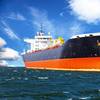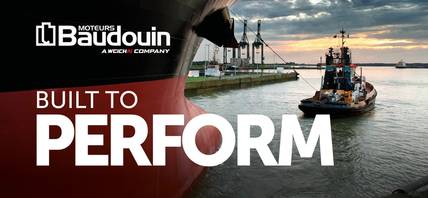Why is a story on a new 105-ft. tug leading off the propulsion performance products section? Because the Vera Bisso, a new 32-m multi-purpose, double-hull tug, being built at Bollinger Shipyards’ Lockport, La. yard for E.N. Bisso & Son, Inc.— offers some interesting propulsion system enhancements to improve and broaden its capabilities.
Similar to other tugs built by E.N. Bisso & Son during the 1990s, Vera Bisso is designed for dual applications. Its initial focus will be on ship assist work along the Mississippi River, for which the vessel possesses exceptional maneuverability. However, with its sturdy build, Vera Bisso is also capable of performing offshore work.
According to Walter Kristiansen, president of E.N. Bisso & Son, the vessel's design resulted from comments solicited from company workers, as well as colleagues. "We started with a blank piece of paper for this tug," said Kristiansen. "We asked customers, ship masters, pilots, our captains, engineers, deckhands and shoreside employees what characteristics they needed. We then attempted to identify ports worldwide with similar conditions as the Mississippi River, and visited with companies that had overcome those conditions. We considered every available technology, and the result of that input and effort was Vera Bisso."
For example, one common request was for a quicker response for the propulsion system. Kristiansen says the company installed propeller shaft braking, so when the captain shifts to neutral, the brakes inflate, stopping the propeller immediately. Since each shaft is equipped with these shaft brakes, the response time between ahead and astern has been greatly improved.
Another concern for captains involved visibility. Vera Bisso was designed with glass surrounding the pilothouse all the way to the deck. In the pilothouse itself, a seven-ft. void was created and all machinery placed within the air-conditioned area. The only machinery required in the pilothouse, are repeaters.
The one blind area on the vessel — near the deckhouse on the stern — has been remedied through the use of a closed circuit television in the pilothouse, allowing the captain full visibility of the vessel. "While E. N. Bisso & Son is an established customer at our dry-docks for regular inspections, conversions and repairs — with 16 drydockings in the last 18 months — this is our first new construction contract with the company," said Scott Theriot, Bollinger executive vice-president/new construction. "This tug will showcase Bollinger quality and Bisso innovation. Because of built-in design features she will be equally effective in port and offshore operations. She is environmentally friendly, has a high bollard pull to hp ratio, is responsive, maneuverable and maintenance- and crew-friendly. I think she will set new standards which will be incorporated into work boats yet-to-be designed.
"Among the other features included on the vessel is a wide clearance between the side shell of the tug and any structure on the tug that might come in contact with a ship, during assist work. In fact, even the tug's stacks are angled inward, permitting the tug to get very close to the bow of any ship.
The engineroom is laid out with maintenance in mind, with both generators in separate spaces, which also helps with noise control, said Kristiansen. For deckhands, safety was the prominent concern. To that end, the company has installed high strength, inherently safe plasma lines on the two Markey deck winches, which have a breaking capacity of at least 560,000-lbs. Also, except for emergency stop switches, controls of the deck winches are located only in the pilothouse, removing the necessity of requiring personnel to be near operating equipment, thereby reducing the possibility of injury.
Overall, Vera Bisso is 105 ft. (32 m) in length, with a 40 ft. (12.1 m) beam and deep loaded draft of 16 ft. (4.8 m). Main propulsion is provided by two EMD 16-645 E6 diesel engines developing a total of 3,900-hp at 900 rpm. They drive two Kaplan four-blade, 138-in. diameter, 111-in. pitch, stainless steel propellers through Haley reverse/reduction gears with a ratio of 6.1:1. The propellers are set in Kort nozzles and steering is provided by six rudders-two main and four flanking. Bollard pull is expected to be more than 66 tons.
Hydraulics for the steering system has been purposely "over designed" to ensure excellent response in all operating conditions and orientation. Rudders will turn through 90-degree arcs instead of the usual 70 degrees, greatly improving maneuvering characteristics. Each rudder will also have two hydraulic cylinders to improve steering response. The rudders can be operated in either a "combined" or traditional mode in which they turn together, or in a "split" mode in which all rudders can be positioned independently improving the tug's maneuverability.
Although not required by law or regulation, "gray water" such as from showers and sinks, is retained aboard for discharge ashore and there is no overboard discharge of any cooling water. Additionally, each fuel tank "vents" to a fuel overflow tank, rather than to the deck, eliminating spills from overfilling any fuel tank.
The tug's double hull reduces the possibility of flooding and its wide beam will reduce its chances of "tripping." The bulwarks are 39-in. high providing for greater crew safety from falling overboard and there is a minimum of seven feet clearance between the deckhouse side and the bulwarks — providing a much wider and clearer area for work on the main deck. All but one of the tug's ladders is inclined, not vertical. The ladder between the engine room and the deckhouse is enclosed and insulated, providing an effective airlock between these spaces, an important feature for fire fighting and noise control.
Sponsored Content
Anschuetz USA: Supporting the U.S. Maritime Industry

Maritime leaders unite to tackle ocean plastic with launch of new alliance: the Maritime Association for Clean Seas

December 2025
 Read the Magazine
Read the Magazine

 Read the Magazine
Read the Magazine
This issue sponsored by:

Sunken Cargo Ship in the Pacific Highlights Need for Reliable Marine Insurance
Subscribe for
Maritime Reporter E-News
Maritime Reporter E-News is the maritime industry's largest circulation and most authoritative ENews Service, delivered to your Email five times per week










